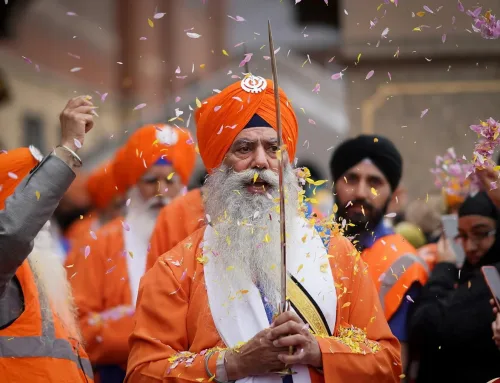
In conversation with our new Jewish Chaplain, Rabbi Jeremy Lawrence.
A few Sentences on Judgment
Rosh Hashana is the Jewish New year, falling Saturday 16th and Sunday 17th September 2023. It is considered one of the Major Festivals and is one where orthodox/observant Jews will not attend to work, travel, answer phones or emails etc.
Rosh Hashana begins the Ten Days of Penitence leading up to Yom Kippur (Monday 25th September 2023) often described as the Holiest Day of the Jewish calendar. Together they are known as the High Holidays or Days of Awe.
The period is solemn and reflective.
Rosh Hashana is distinguished as the festival where the Ram’s Horn (Shofar) is sounded (though not on Shabbat). It is a call to penitence and a proclamation of God as Sovereign Lord of the Universe.
The traditional greeting is “Leshana Tova” – “Wishing you a good new Year” or “Chatima Tova” – “May you be inscribed in the Book of Life.”
Rosh Hashana begins an intensive month of Jewish Holy Days with a strong focus on Judgment. According to the Talmud, on Rosh Hashana each of us pass before God who assesses our deeds and makes a provisional judgment. As a child, I remember sitting in synagogue through a lengthy service wondering at precisely which moment I would have my audience with the Almighty. Would I know that it was happening? If it happened early in the day, did that mean I could go home and skip the rest of the service?
While I have since developed a more sophisticated understanding of the mechanics of prayer and spiritual relationships, the notion that each of us is individually considered remains an important one. Right and wrong in our lives is not just a matter for those who are saints or villains. I imagine each of us is confronted in our own ways with challenges with better or worse moral outcomes.
We might reflect on how much our advice is truly dispassionate as against motivated by our own potential gain. Do we invest time and manners in helping a colleague improve, offering only constructive criticism? Or do we occasionally enjoy the chance to show our superiority in our commentary, relishing others’ rookie mistakes in a sink-or-swim workplace. Are we honest in our timekeeping, considerate in sharing the domestic/family workload? Are we models of philanthropy, stretching ourselves to make a difference in the lives of others?
One of the great spiritual ethicists of the last century, Rabbi Elijah Dessler was born in Lithuania 1892, served as a Rabbi in England in the 30’s (Dalston and Gateshead) before moving to Bnei Brak in the late 1940s was profoundly concerned that we did not attend to such questions.
He wrote that each individual has a nekudat bechira, a point of choice. For the brigand, it might be whether to hit the little old lady before pushing her into a ditch and stealing her handbag (or just grab the bag and run). For the sub-editor, who would never mug anyone, it might be whether to sensationalise the headline impugning the integrity of a lesser celeb, even though the core article casts no aspersions. For the spiritual leader, (who would never dream of disparaging anyone!?) the challenge might be whether to spend an extra moment researching texts and reflecting on the message, rather than giving ChatGPT a few choice keywords, have his sermon written in moments and spend the rest of the day reading Private Eye.
While we conjecture a mugger-bad and cleric-good paradigm, Rabbi Dessler admonished that the mugger’s choice not to hit might be as morally taxing in his/her world for the mugger as my choice to improve greater investment in my spiritual endeavours. We all have different “points of choice” but the choice to change and improve our ways might be just as hard, wherever we are on the sinner-saint continuum.
Since reading Rabbi Dessler, my Rosh Hashana prayers have seen me less concerned with when God is going to get around to judging me and a little more concerned with when I’m going to take a long hard look at myself, imagining how I look to God, to ‘fess up and to embrace the opportunity to become a better person in the year ahead.
Wishing you and your families all happiness and health for the new Jewish Year (5784).
Rabbi Jeremy Lawrence






